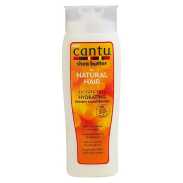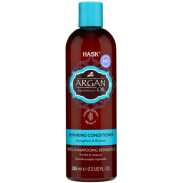Comparison between Cantu Hydrating Cream Conditioner vs. HASK Argan Oil Repairing Conditioner
- 17 components -
- 21 components -
Find out which product is better for your skin.
Ingredients in both products 7
Stearyl Alcohol, Cetyl Alcohol, Butyrospermum Parkii (Shea) Butter, Phenoxyethanol, Fragrance and 2 more. Show all.
Components only in Cantu Hydrating Cream Conditioner 10
Water (Aqua, Eau), Stearamidopropyl Dimethylamine, Glyceryl Stearate SE, Neopentyl Glycol Diheptanoate and 5 more. Show all.
Uniqueness: 58.8%
Components only in HASK Argan Oil Repairing Conditioner 14
Water, Behentrimonium Chloride, Isopropyl Palmitate, Argania Spinosa (Argan) Kernel Oil, Olea Europaea (Olive) Oil and 9 more. Show all.
Uniqueness: 66.7%
Face to Face
Components position by position
1
Water (Aqua
1
Water
2
Eau)
2
Cetyl Alcohol
3
Stearyl Alcohol
3
Behentrimonium Chloride
4
Cetyl Alcohol
4
Isopropyl Palmitate
5
Butyrospermum Parkii (Shea) Butter
5
Argania Spinosa (Argan) Kernel Oil
6
Stearamidopropyl Dimethylamine
6
Butyrospermum Parkii (Shea) Butter
7
Glyceryl Stearate SE
7
Olea Europaea (Olive) Oil
8
Phenoxyethanol
8
Cocos Nucifera (Coconut) Oil
Show others
Positive Effects
Find out what good effects the product has
Both products provide the following effects: , UV Protection, Moisturizing, Cleansing, Softening, Soothing, Anti-aging, Lightening, Healing, Rejuvenation, Antiseptic, Deodorant, Hair conditioning, Hair structure improvement, Hair gloss, Hair protection, Hair growth stimulating
Effects unique for Hydrating Cream Conditioner:
Acne fightingEffects unique for Argan Oil Repairing Conditioner:
Antioxidant, Lifting, Elasticity improvement, Antistatic, Nutrifying, Antifungal, Tones up skin, Regeneration, Anti dandruff, Hair follicle nutrition-- Show more --
ECO Metrics
Find out how eco-friendly the components are
Vegan
No
No
Cruelty free
No
Yes
Reef safe
Yes
Yes
Ozone layer safe
Yes
Yes
Organic score
natural
3 out of 17
18%
chemical
11 out of 17
65%
natural
8 out of 21
38%
chemical
12 out of 21
57%
Concerns
Pay attention to this information
-- Extra information --
Components by Skin Type
Find out what components are good or bad for your skin type
Dry skin
Positive: 2Negative: 0
Stearyl Alcohol#3Panthenol#15
Oily skin
Positive: 0Negative: 1
Glyceryl Stearate SE#7
Sensitive skin
Positive: 0Negative: 2
Lactic Acid#11Benzyl Benzoate#17
Dry skin
Positive: 3Negative: 0
Panthenol#10Glycerin#12Stearyl Alcohol#13
Oily skin
Positive: 0Negative: 2
Isopropyl Palmitate#4Cocos Nucifera (Coconut) Oil#8
Sensitive skin
Positive: 0Negative: 3
Citric Acid#16Benzyl Benzoate#20Limonene#21

